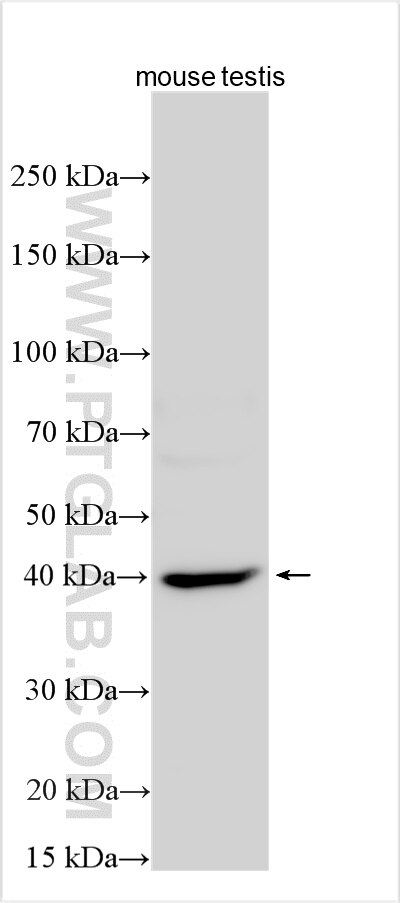Tested Applications
| Positive WB detected in | mouse testis tissue |
Recommended dilution
| Application | Dilution |
|---|---|
| Western Blot (WB) | WB : 1:500-1:3000 |
| It is recommended that this reagent should be titrated in each testing system to obtain optimal results. | |
| Sample-dependent, Check data in validation data gallery. | |
Product Information
30239-1-AP targets USP50 in WB, ELISA applications and shows reactivity with human, mouse samples.
| Tested Reactivity | human, mouse |
| Host / Isotype | Rabbit / IgG |
| Class | Polyclonal |
| Type | Antibody |
| Immunogen |
CatNo: Ag31275 Product name: Recombinant human USP50 protein Source: e coli.-derived, PET28a Tag: 6*His Domain: 145-290 aa of BC146493 Sequence: NELHEALKKYHYSRRRSYEKGSTQRCCRKWITTETSIITQLFEEQLNYSIVCLKCEKCTYKNEVFTVFSLPIPSKYECSLRDCLQCFFQQDALTWNNEIHCSFCETKQETAVRASISKAPKIIIFHLKRFDIQGTTKRKLRTDIHY Predict reactive species |
| Full Name | ubiquitin specific peptidase 50 |
| Calculated Molecular Weight | 339 aa, 39 kDa |
| Observed Molecular Weight | 40 kDa |
| GenBank Accession Number | BC146493 |
| Gene Symbol | USP50 |
| Gene ID (NCBI) | 373509 |
| Conjugate | Unconjugated |
| Form | Liquid |
| Purification Method | Antigen affinity purification |
| UNIPROT ID | Q70EL3 |
| Storage Buffer | PBS with 0.02% sodium azide and 50% glycerol, pH 7.3. |
| Storage Conditions | Store at -20°C. Stable for one year after shipment. Aliquoting is unnecessary for -20oC storage. 20ul sizes contain 0.1% BSA. |
Background Information
USP50 (Ubiquitin Specific Peptidase 50) is a deubiquitinating enzyme that belongs to the USP family. It plays a key role in DNA replication, genome stability and cell cycle regulation. Recent studies have found that USP50 maintains the stability of the DNA replication process and telomere integrity by regulating the use of nuclease and deconjugating enzymes. During replication, USP50 was able to inhibit the harmful DNA2 nuclease activity and substitute the use of RecQ deconjugase, thereby preventing replication fork stalling and DNA damage. In addition, USP50 plays a role in the cell cycle G2/M phase transition, assembly of the NLRP3 inflammasome complex, and organization of nuclear speckles. Its loss of function leads to DNA double-strand breaks and telomere instability in cells under replication stress. These findings provide new insights into the understanding of the pathogenesis of genetic diseases and may offer potential targets for the treatment of diseases such as cancer and premature aging.
Protocols
| Product Specific Protocols | |
|---|---|
| WB protocol for USP50 antibody 30239-1-AP | Download protocol |
| Standard Protocols | |
|---|---|
| Click here to view our Standard Protocols |




